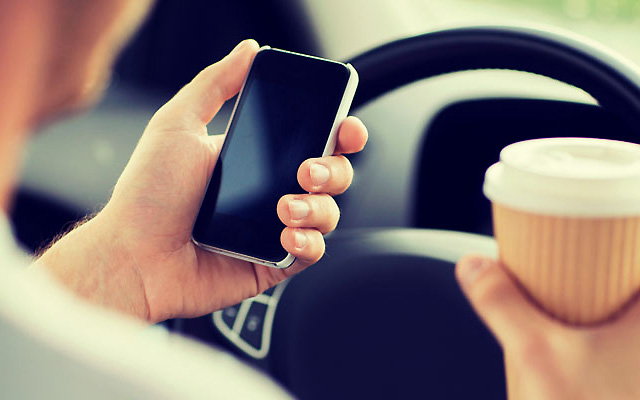
1 December 2023
Using a mobile at the wheel it is still a common occurrence seen by 93% of drivers, despite today (1 Dec) being the 20th anniversary of the ban on the use of hand-held mobile phones in vehicles, according to The AA Charitable Trust.
The number of fixed penalty notices for using a phone has decreased dramatically from 162,400 in 2011 to 19,700 last year but the AA Trust questions whether this is down to better compliance or less enforcement. It is estimated there has been a 20% decrease in dedicated traffic police over the last decade. In 2022 in addition to the 19,700 fixed penalties some 4,336 were convicted at court with an average fine of £197.
Likelihood of being caught**
According to government research when it comes to the perceived likelihood of being caught by the police, about half of motorists thought it is unlikely they will get caught using a handheld mobile phone while driving/riding (49%).
Lost lives
Over the last twenty years far too many lives have been lost because of drivers using a phone at the wheel.
Kate Goldsmith's 11-year-old daughter Aimee was killed when HGV driver Tomasz Kroker, scrolling through music on his phone, ploughed into the back of the car she was in. The court heard that Kroker had barely glanced at the road for 1km. He had spent 45 seconds looking at the phone’s screen so that when the traffic had slowed, he was unable to respond, smashing into the vehicle in front at 50mph, causing the fatal domino effect. He was convicted of causing death by dangerous driving and sentenced to 10 years in prison, with the judge saying his attention had been so poor ‘he might as well have had his eyes closed’.
A dash cam video showed him oblivious of the danger until it was too late.
Aimee's step-brothers Ethan and Josh Houghton, 13 and 11, and their mum Tracy, 45, were also killed in the crash on the A34 near West Ilsley on August 10 2016.
Campaigns
Kate Goldsmith has since campaigned with the AA Trust for greater awareness of the consequences and stricter penalties for using phones at the wheel. Kate Goldsmith said: “The use of mobiles at the wheel has been illegal for 20 years. My daughter Aimee died because of such actions more than seven years ago, yet we still see people on the phone daily.
“I have campaigned for years to highlight the dangers of mobile phone use. I even went out with road traffic officers, telling my story to the drivers they stopped. I thought, “If I can just save one person, then that’s good enough.” ‘But it’s not good enough. Surely, we can do better than that?’ Take it from me the consequences of such actions don’t bear thinking about and never disappear.”
Edmund King OBE, Director of the AA Charitable Trust, said: “It is tragic that twenty years on people are still being killed and seriously injured on our roads due to selfish drivers using their phones. Despite high profile campaigns from ourselves, government and others, the use of phone is still not as socially unacceptable as drink driving. This is despite our previous research that you're twice as likely to crash text driving as you are drink driving. You wouldn't drink and drive. Don't text and drive."***
Facts
In 2020, 17 people were killed and 499 injured in road traffic collisions in Great Britain where the driver was using a mobile phone. This compares with 55 deaths and 3,119 injuries in collisions where ‘distraction in vehicle’ was recorded as a contributory factor.
In 2021, the proportion of van drivers using a phone (1.9%) was nearly double that for car drivers (0.8%). This was a similar pattern to the previous surveys in 2017 and 2014.
The highest proportion of drivers using a hand-held mobile phone whilst driving in 2021 was for heavy goods vehicles (2.2%). **** Legislation on mobile phone use whilst driving
- On 1 December 2003, legislation was introduced making it illegal to use a hand-held mobile phone whilst driving on the road. Drivers caught using a hand-held mobile phone whilst driving may be issued with a fixed penalty notice with points on the driving licence and a fine.
- In February 2007, the penalty for using a mobile phone whilst driving increased from a £30 fine to a £60 fine and 3 driving licence points.
- These fines increased to £100 in 2013 and then again to £200 and 6 penalty points in March 2017, with a maximum fine of £1,000 (£2,500 if driving a lorry or bus) if the case goes to court. If a case goes to court, the driver or rider may be disqualified from driving or riding.
- In 2022, a loophole in the law where you can drive, take photos, videos or play games was closed. If you drive and use a handheld device in any capacity, you could receive a £200 fine and six penalty points on your licence.
- With six points, drivers who passed their test in the last two years, will lose their licence, and need to re-take the test.
Why?
The research suggests that some people are addicted to their phones as evidenced by people walking the streets glued to their phones. In a 2017 poll for the AA Charitable Trust (based on 17,979 drivers) more than half of young drivers (51 per cent) said they couldn’t bring themselves to turn off their phones before driving; nor could 21 per cent of the general driving population.
Call to action
Ultimately the responsibility lies with drivers to abide by the law. However, the fact that almost half of drivers think it unlikely they will be caught shows we need more targeted high profile police campaigns. Several successful campaigns have used police in HGVs making it easier to spot offenders in other vehicles.
New cameras, using AI, aimed at catching drivers using their mobile phone behind the wheel are proving successful in police trials so should be rolled out as soon as practical. *****
Think! and other campaigns also help to remind drivers the importance of not using the phone at the wheel.
AA Trust Campaigns
Cadence
The AA Charitable Trust has long campaigned to change attitudes towards driver distraction. A young filmmaker, Emmeline Hartley, became so uncomfortable by her peers using mobiles at the wheel that she produced a film. Called ‘Cadence’, the film has a safety twist and was developed in association with the AA Charitable Trust. See https://www.youtube.com/watch?v=mL3SrAOOFHs
Designated Driver
The AA Charitable Trust created an ad raising awareness of the dangers of distracted driving which was promoted by Think! in cinemas and television on demand.
The ad highlights the danger of texting while driving. It explains that you’re twice as likely to crash text driving as you are drink driving.
*AA Yonder poll of 12,140 AA members May 2023
**Research on mobile phone use DfT 2021 Research on the use of mobile phones while driving - GOV.UK (www.gov.uk)
***Twice As Likely To Crash Text Driving As Drink Driving | AA (theaa.com)
*****AI cameras that can spot mobile phone use prove successful in trials (fleetnews.co.uk)
